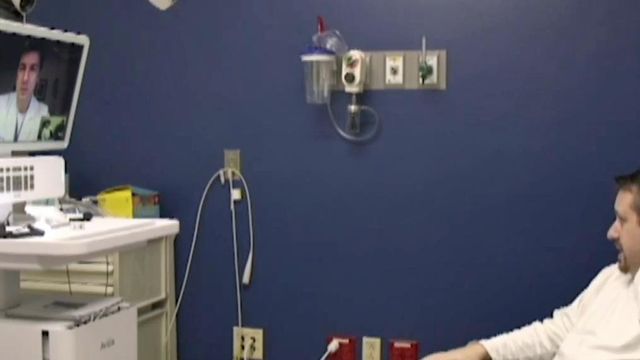Duke using telemedicine to cut ER wait times
Many people are often reluctant to seek emergency care at a hospital because they think they'll be stuck in a crowded waiting room for hours before they see a doctor. Duke University Hospital's emergency department is trying to use telemedicine to address the concerns.
Posted — UpdatedDuke University Hospital's emergency department is trying to use telemedicine to address the concerns.
Tyler Wheeler's wife recently convinced him to come to Duke's emergency room to check out worrisome symptoms – chest pain, upper back pain and shooting pain in his neck.
Wheeler didn't sit in the waiting room long before he was led into a room where a Duke emergency physician listened to his heart and lungs through the use of a TeleHealth Cart.
Duke emergency physician Dr. Neel Kapadia says a handful of emergency departments use the interactive tool before patients leave the hospital.
A Duke pilot program tested their use for non-critical patients soon after they arrive at times of peak demand.
"The physician can ask any question that is necessary. The patient's not waiting any longer for anything to be started on their care," Kapadia said.
The physician may be on call, meaning he or she is speaking to patients from home. But the physician can still order blood tests and imaging, making real progress on the patient's case even though the patient may be sent right back out to the hospital's waiting room.
"So, then when they do ultimately get into a room, a lot more information is already back," Kapadia said. "It saves them an hour and allows us to turn over the room faster and get that next patient into a room."
Wheeler says his use of Skype and other technology made his TeleHealth experience a smooth one.
"It was very comfortable and natural. Any way you can get out of a hospital quicker is always a great thing," he said. "But you certainly want to get taken care of, and I felt like I got the attention I needed."
Duke's pilot program ends in April, but the hospital has already identified it as a useful technology, so officials plan on expanding the TeleHealth Cart's use in emergency care.
• Credits
Copyright 2024 by Capitol Broadcasting Company. All rights reserved. This material may not be published, broadcast, rewritten or redistributed.





